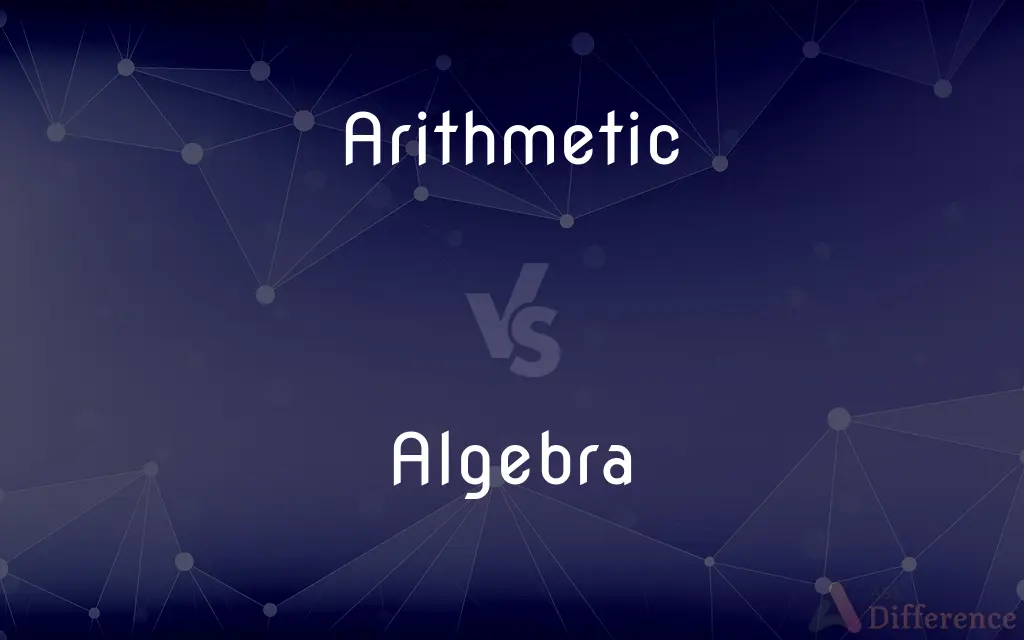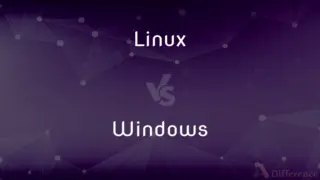Arithmetic vs. Algebra — What's the Difference?
By Tayyaba Rehman — Updated on October 30, 2023
Arithmetic deals with basic operations on numbers, while Algebra involves finding unknowns using symbols and equations.

Difference Between Arithmetic and Algebra
Table of Contents
ADVERTISEMENT
Key Differences
Arithmetic is the branch of mathematics that deals with basic number operations like addition, subtraction, multiplication, and division. It's the foundational aspect of mathematics that most people are first introduced to during their early education. On the other hand, Algebra delves into the realm of unknown values, using symbols (often letters) to represent these values and forming equations to solve for them.
While Arithmetic remains confined to specific numbers and their manipulations, Algebra broadens this scope by introducing variables. This allows for a more generalized approach to problems, where solutions can be applied to multiple scenarios, not just the ones with known quantities.
Arithmetic can often be visualized with tangible objects. For instance, adding two apples to three apples gives you five apples. In contrast, Algebra often requires abstract thinking. For instance, if x apples and y apples are combined, you have x + y apples, even if you don't know their exact quantities.
In real-world applications, Arithmetic might be used for simple calculations, like budgeting or determining the quantity of materials needed for a project. Algebra, however, can be employed to solve more complex problems, like predicting future trends based on variable growth rates or determining the value of one commodity based on the value of another.
To sum it up, Arithmetic forms the backbone of our basic numerical understanding, making everyday calculations feasible. Algebra, with its symbols and equations, equips us with the tools to tackle problems that are more complex and abstract in nature.
ADVERTISEMENT
Comparison Chart
Nature
Concrete, dealing with specific numbers.
Abstract, using symbols to represent unknowns.
Operations
Basic operations like addition, subtraction.
Equations, solving for variables.
Visualization
Tangible, e.g., counting objects.
Abstract, using symbols for unknown quantities.
Real-world Usage
Everyday calculations like budgeting.
Complex problem-solving, predictions based on variables.
Skill Development
Basic number sense and calculation skills.
Abstract thinking, problem-solving using equations.
Compare with Definitions
Arithmetic
The method or process of computation with figures.
The arithmetic of the situation means we can't afford the purchase.
Algebra
A branch of mathematics involving symbols and rules for manipulating those symbols.
Algebra is used to solve equations with unknown variables.
Arithmetic
Concerned with properties and manipulation of numbers.
Arithmetic operations include addition, subtraction, and multiplication.
Algebra
Concerned with general statements and the formal structures of mathematics.
Algebraic expressions can be simplified or factored for easier computation.
Arithmetic
Arithmetic (from the Greek ἀριθμός arithmos, 'number' and τική [τέχνη], tiké [téchne], 'art' or 'craft') is a branch of mathematics that consists of the study of numbers, especially concerning the properties of the traditional operations on them—addition, subtraction, multiplication, division, exponentiation and extraction of roots. Arithmetic is an elementary part of number theory, and number theory is considered to be one of the top-level divisions of modern mathematics, along with algebra, geometry, and analysis.
Algebra
Relating to abstract structures and relationships in mathematics.
Algebraic equations can represent real-world problems.
Arithmetic
The mathematics of integers, rational numbers, real numbers, or complex numbers under addition, subtraction, multiplication, and division.
Algebra
A unifying thread of almost all mathematics including geometry, calculus, and statistics.
Algebra forms the basis for more advanced mathematical studies.
Arithmetic
Of or relating to arithmetic.
Algebra
Algebra (from Arabic: الجبر, romanized: al-jabr, lit. 'reunion of broken parts, bonesetting') is one of the broad areas of mathematics, together with number theory, geometry and analysis. In its most general form, algebra is the study of mathematical symbols and the rules for manipulating these symbols; it is a unifying thread of almost all of mathematics.
Arithmetic
Changing according to an arithmetic progression
The increase in the food supply is arithmetic.
Algebra
A branch of mathematics in which symbols, usually letters of the alphabet, represent numbers or members of a specified set and are used to represent quantities and to express general relationships that hold for all members of the set.
Arithmetic
The mathematics of numbers (integers, rational numbers, real numbers, or complex numbers) under the operations of addition, subtraction, multiplication, and division.
Algebra
A set together with a pair of binary operations defined on the set. Usually, the set and the operations simultaneously form both a ring and a module.
Arithmetic
(mathematics) Of, relating to, or using arithmetic; arithmetical.
Arithmetic geometry
Algebra
A system for computation using letters or other symbols to represent numbers, with rules for manipulating these symbols.
Arithmetic
(arithmetic) Of a progression, mean, etc, computed solely using addition.
Arithmetic progression
Algebra
The surgical treatment of a dislocated or fractured bone. Also (countable): a dislocation or fracture.
Arithmetic
The science of numbers; the art of computation by figures.
Algebra
The study of algebraic structures.
Arithmetic
A book containing the principles of this science.
Algebra
A universal algebra.
Arithmetic
The branch of pure mathematics dealing with the theory of numerical calculations
Algebra
An algebraic structure consisting of a module over a commutative ring (or a vector space over a field) along with an additional binary operation that is bilinear over module (or vector) addition and scalar multiplication.
Arithmetic
Relating to or involving arithmetic;
Arithmetical computations
Algebra
A collection of subsets of a given set, such that this collection contains the empty set, and the collection is closed under unions and complements (and thereby also under intersections and differences).
Arithmetic
The branch of mathematics dealing with basic number operations.
Learning arithmetic is essential for everyday calculations.
Algebra
One of several other types of mathematical structure.
Arithmetic
The simple calculation of numerical figures.
I use arithmetic to balance my checkbook.
Algebra
(figurative) A system or process, that is like algebra by substituting one thing for another, or in using signs, symbols, etc., to represent concepts or ideas.
Arithmetic
Relating to the skills of arithmetic operations.
Arithmetic skills are tested in school from an early age.
Algebra
That branch of mathematics which treats of the relations and properties of quantity by means of letters and other symbols. It is applicable to those relations that are true of every kind of magnitude.
Algebra
A treatise on this science.
Algebra
The mathematics of generalized arithmetical operations
Algebra
The study of mathematical symbols and the rules for manipulating these symbols.
In algebra, we often use the letter x as a placeholder.
Common Curiosities
Is algebra only about finding "x"?
No, algebra involves understanding relationships, forming equations, and solving for various unknowns, not just "x".
Why is algebra important?
Algebra allows for solving complex problems, making generalizations, and understanding patterns.
Can you give an example of algebra in daily life?
Budgeting for future expenses based on variable income is a practical application of algebra.
Is algebra applicable in real life?
Absolutely, algebra helps in problem-solving, making predictions, and understanding variable relationships in various fields.
Can you do algebra without knowing arithmetic?
Arithmetic forms the foundation, so understanding it is crucial before diving into algebra.
How is algebra different from calculus?
Algebra focuses on equations and unknowns, while calculus deals with change and rates of change.
Can arithmetic be used in algebra?
Yes, arithmetic operations are fundamental and are used within algebraic equations.
Why is arithmetic taught first in schools?
Arithmetic forms the basic numerical foundation, making it a logical starting point.
Is arithmetic simpler than algebra?
Generally, arithmetic is more straightforward, focusing on basic operations, while algebra introduces abstract concepts.
Are calculators more suited for arithmetic or algebra?
Calculators can handle both but might be more frequently used for arithmetic operations.
How is algebraic geometry different from algebra?
Algebraic geometry studies geometric structures using algebraic methods, combining both disciplines.
Are there jobs specifically requiring strong arithmetic skills?
Yes, careers like accounting or retail management often require robust arithmetic skills.
Why do some students find algebra challenging?
Algebra introduces abstract thinking, which can be a shift from the concrete nature of arithmetic, making it challenging for some.
Is arithmetic limited to whole numbers?
No, arithmetic can also deal with fractions, decimals, and even complex numbers.
Are there advanced fields in arithmetic like in algebra?
Yes, number theory is an advanced field that dives deep into properties and relationships of numbers.
Share Your Discovery

Previous Comparison
Nostalgia vs. Melancholy
Next Comparison
Linux vs. WindowsAuthor Spotlight
Written by
Tayyaba RehmanTayyaba Rehman is a distinguished writer, currently serving as a primary contributor to askdifference.com. As a researcher in semantics and etymology, Tayyaba's passion for the complexity of languages and their distinctions has found a perfect home on the platform. Tayyaba delves into the intricacies of language, distinguishing between commonly confused words and phrases, thereby providing clarity for readers worldwide.
















































